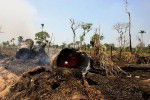Citizen Campaign to End Ecocide in Europe

IES supports European Citizen’s Initiative launched at European Parliament
Brussels, 22 January 2013
On 22 January 2013, the European Citizens’ Initiative (ECI) ‘End Ecocide in Europe’ was officially launched at the European Parliament. Staff members of IES were invited to attend the event. Among the guests were three Members of the European Parliament - Eva Joly, Jo Leinen, and Keith Taylor - who were the first to sign the Initiative.
This Initiative is closely connected to the international campaign ‘Eradicating Ecocide’, led by eminent international lawyer Polly Higgins. She defines ecocide as ‘the extensive damage to, destruction of or loss of ecosystem(s) of a given territory, whether by human agency or by other causes, to such an extent that peaceful enjoyment by the inhabitants of that territory has been or will be severely diminished’.
The organisers of the ECI will have one year to collect one million signatures from European citizens, proportionally distributed by the size of each country. If the campaign ‘End Ecocide in Europe’ succeeds, the organisers will have the opportunity to present their Initiative in a public hearing at the European Parliament and to propose their Draft Ecocide Directive. Subsequently, the European Commission will adopt a formal response spelling out what action it will propose in response to the citizens' initiative, if any, and the reasons for doing or not doing so.
On 5 November 2012, IES and Ecojust organised a workshop on ‘Ecocide: Developing a View from The Hague’. The event was attended by eighteen international legal and environmental experts, with Polly Higgins as special guest speaker. The focus was on discussing the matter from the perspective of The Hague as ‘Legal Capital of the World’ and in particular the issue of how legal institutions in The Hague could include ecocide as part of their mandate, making ecocide an international crime.
Speaking at the workshop, Reinhold Gallmetzer from the Office of the Prosecutor at the International Criminal Court (ICC) said:
“There is indeed a lack of precise legislation on ecocide. It may help to ‘crystallize’ the situation to have reflections from the perspective of the Office of the Prosecutor, which of course looks at existing law and does not create new law. The only provision in the Rome Statute where damage to the environment is explicitly mentioned is the Article on War Crimes (Art 8(2)(b)(iv) [1]. Environmental crimes such as pollution of water wells and destruction of ecosystems can also be seen in the light of the crime against humanity.
The ‘body’ has to be dealt with at the national level, but the ICC can play a leading role. The deterrent role of the ICC is important here and more and more national governments are paying attention to what the ICC is doing.
Bringing ecocide under the Statute has to be pursued, but it is a very lengthy process: it requires 4/5 of all member states to ratify an amendment, which may take decades. In the meantime, make creatively use of existing tools on all levels.”
Wouter Veening, President of IES, elaborated on these tools, adding that: “In the legal world, support for creating a body of law on Earth Rights is gaining momentum, including the human right to a clean environment. This all needs strong international vocalisation. Public awareness of ecocide as a crime is also important to support campaigns on more specific issues, for example, to build a case against the perpetrators of climate change.”
IES is supporting the ‘End Ecocide in Europe’ campaign especially in the Netherlands where the campaign coordinator, Kirsty Donald, is working to obtain the required 19,500 signatures among Dutch residents.
______
[1] “Intentionally launching an attack in the knowledge that such attack will cause incidental loss of life or injury to civilians or damage to civilian objects or widespread, long-term and severe damage to the natural environment which would be clearly excessive in relation to the concrete and direct overall military advantage anticipated”.